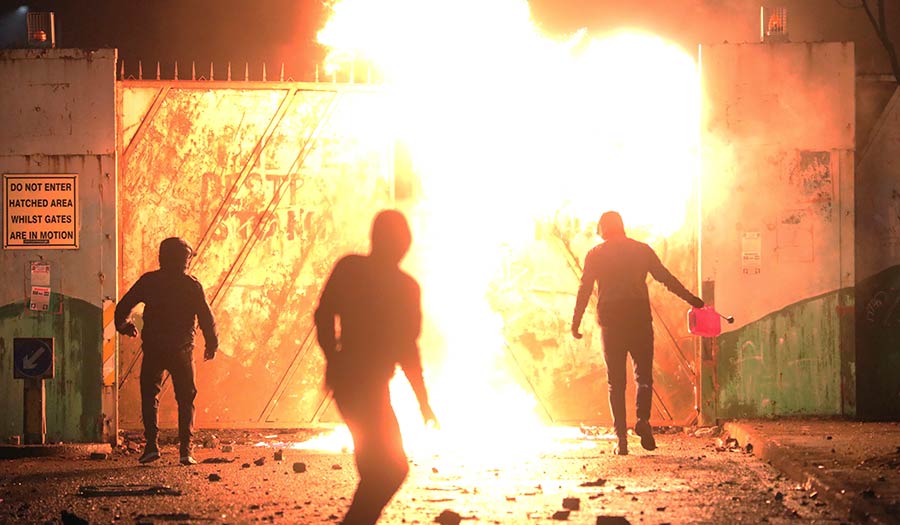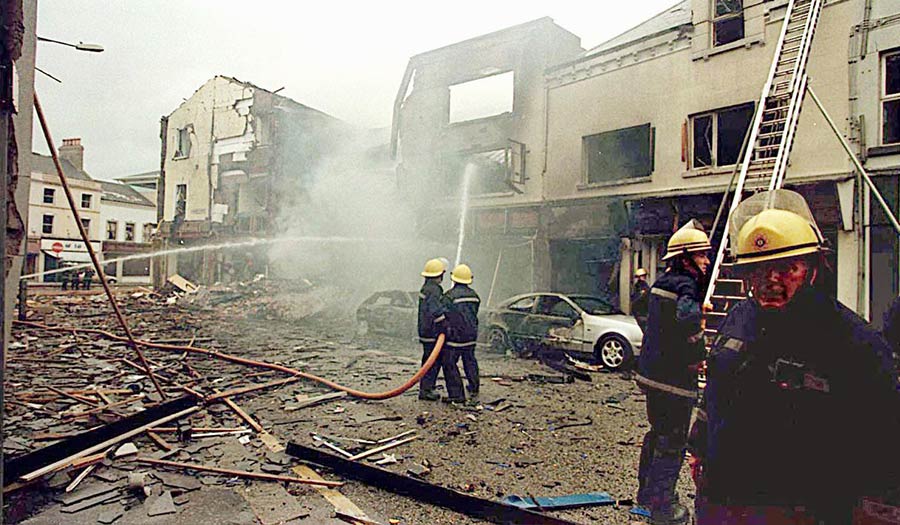 AP/Peter Morrison
AP/Peter Morrison
World News Desk
Learn the why behind the headlines.
Subscribe to the Real Truth for FREE news and analysis.
Subscribe NowBELFAST, Northern Ireland (AP) – Authorities in Northern Ireland sought to restore calm Thursday after Protestant and Catholic youths in Belfast hurled bricks, fireworks and gasoline bombs at police and each other. It was the worst mayhem in a week of street violence in the region, where Britain’s exit from the European Union has unsettled an uneasy political balance.
Crowds including children as young as 12 or 13 clashed across a concrete “peace wall” in west Belfast that separates a British loyalist Protestant neighborhood from an Irish nationalist Catholic area. Police fired rubber bullets at the crowd, and nearby a city bus was hijacked and set on fire.
Northern Ireland has seen sporadic outbreaks of street violence since the 1998 Good Friday peace accord ended “the Troubles”—decades of Catholic-Protestant bloodshed over the status of the region in which more than 3,000 people died.
But Police Service of Northern Ireland Assistant Chief Constable Jonathan Roberts said Wednesday’s mayhem “was at a scale we have not seen in recent years.” He said a total of 55 police officers had been injured over several nights of disorder and it was lucky no one had been seriously hurt or killed.
Britain’s split from the EU has highlighted the contested status of Northern Ireland, where some people identify as British and want to stay part of the UK, while others see themselves as Irish and seek unity with the neighboring Republic of Ireland, an EU member.
Unrest has erupted over the past week—largely in loyalist, Protestant areas—amid rising tensions over post-Brexit trade rules and worsening relations between the parties in the Protestant-Catholic power-sharing Belfast government.
UK Prime Minister Boris Johnson condemned the unrest, saying “the way to resolve differences is through dialogue, not violence or criminality.” He sent Northern Ireland Secretary Brandon Lewis to Belfast for talks with the region’s political leaders.
Meanwhile, Northern Ireland’s Belfast-based assembly and government held emergency meetings Thursday and called for an end to the violence.
First Minister Arlene Foster, of the pro-British Democratic Unionist Party, warned that “Northern Ireland faces deep political challenges ahead.”
“We should all know that when politics are perceived to fail, those who fill the vacuum cause despair,” said Ms. Foster, who heads the Northern Ireland government.
Deputy First Minister Michelle O’Neill, of Irish nationalist party Sinn Fein, called the violence “utterly deplorable.”
Despite the united message, Northern Ireland’s politicians are deeply divided, and events on the street are in many cases beyond their control.
As many predicted it would, the situation has been destabilized by Britain’s departure from the EU—after almost 50 years of membership—that became final on December 31.
A post-Brexit UK-EU trade deal has imposed customs and border checks on some goods moving between Northern Ireland and the rest of the UK. The arrangement was designed to avoid checks between Northern Ireland and Ireland because an open Irish border has helped underpin the peace process built.
But unionists say the new checks amount to the creation of a border between Northern Ireland and the rest of the UK—something they fear undermines the region’s place in the United Kingdom.
The latest disturbances followed unrest over the Easter long weekend in pro-British unionist areas in and around Belfast and Londonderry, also known as Derry, that saw cars set on fire and projectiles and gasoline bombs hurled at police officers.
Some politicians and police have accused outlawed paramilitary groups—which remain a force in working class communities—of inciting young people to cause mayhem. They expressed outrage that a new generation was being exposed to, and pulled into, violence.
Northern Ireland Justice Minister Naomi Long, from the centrist Alliance Party, said she was horrified to watch footage of adults “standing by cheering and goading and encouraging young people on as they wreaked havoc in their own community.”
“This is nothing short of child abuse,” she said.
“It’s really easy to see how it could get worse,” Katy Hayward, a politics professor at Queen’s University Belfast and senior fellow of the UK in a Changing Europe think tank said. “There’s many factors, including, obviously, criminal gangs at work who benefit from chaos like this…So that you could see how things can definitely escalate.”
- Real Truth Magazine Articles
- ANALYSIS
 Could Brexit Cause Another Irish War?
Could Brexit Cause Another Irish War?
Other Related Items:
More on Related Topics:
- France Has a New Government, Again. Politics and Crushing Debt Complicate Next Steps
- German Chancellor Loses Confidence Vote, Setting Up an Early Election in February
- French Government Felled in No-confidence Vote, Deepening Political Crisis
- What Does President Biden’s Decision to Allow Ukraine to Use Longer-range U.S. Weapons Mean for the War?


